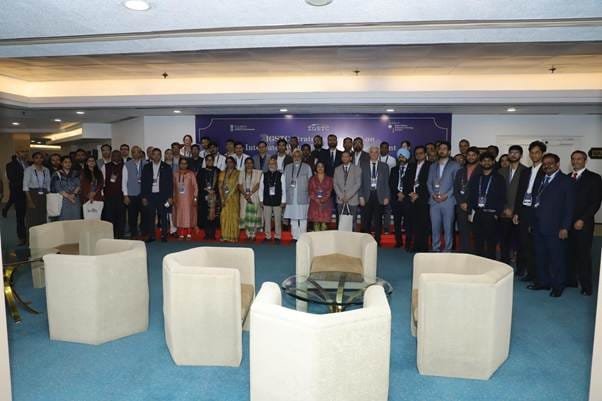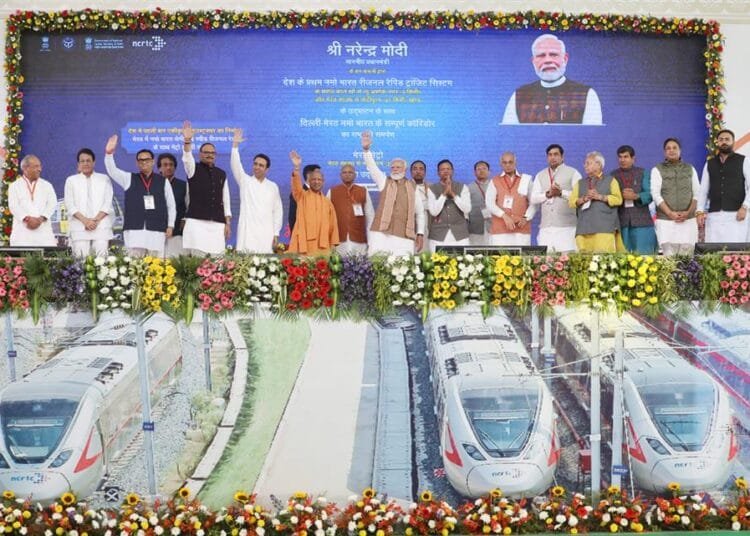Expert wants farmers educated on water use
Having put its renewable energy programme in progress mode, India needs to now drive efficient products and services for its water resources, given the country being critically vulnerable to climate change, according to an environment expert at a conference held in Singapore.
“I think it is important that India’s Bureau of Water Use Efficiency—similar to BEE—ensures that its activities, whether developing standards or regulatory direction, lead to the promotion of efficient use of water in irrigation, municipal and industrial sectors,” said Dr Arunabha Ghosh, CEO of the New Delhi-based Council on Energy, Environment and Water (CEEW). BEE is one of the successful renewable energy-guiding groups in India.
Noting work is being done on managing the resources, he also wants pockets of successes seen across the country to be adopted and scaled for conserving water.
Speaking on the sidelines of Ecosperity Week 2025, held May 5-8, Dr Ghosh noted improvements in the expansion of water infrastructure in the country, such as Jal Jeevan Mission that provides functional tap connection within the premises of rural households, but was quick to add that there are a lot of areas for efficient use of water, especially in the agriculture sector https://waterindia.net/.
India has some 140 million hectares under agriculture and farming, where one of the most unproductive and age-old practices is to flood the fields for some seasonal crops. This is where water is being wasted for non-beneficial consumptive purposes, he pointed out, making an urgent call to educate farmers on water use and installation of technology-driven irrigation systems. The latter includes drip and sprinkler irrigation technologies.
Among other developments, natural farming has started in Andhra Pradesh which requires consciously lesser use of water. It is now a national initiative and aims to reduce or eliminate fertilizer use and save water while gaining from increased farm output.
CEEW’s survey of 31 sustainable agricultural practices finds that five of them have exceeded 5 million hectares, showing the potential of more sustainable practices. Water harvesting is one of them, he added https://sbi.com.in/.
Retaining soil moisture is a hugely important approach for not just conserving water but improving crop yields. “If you flood your fields, your output actually comes down,” Press Trust of India quoted Dr Ghosh as saying.
Water conservation and water adaptation should not be an environmental sustainability agenda but an actual economic growth agenda, he stressed.
By conserving water, farm output will go up, while the saved water can be re-allocated for industry and domestic use that then can increase industrial production and have public health benefits, respectively. “This way we are generating higher output from agriculture and industry, and helping contribute to the country’s growing economy,” said Dr Ghosh, who, through 15 years of leading CEEW, participated in a large number of national and state-level studies and projects.
He pointed out that less than 30 percent of domestic wastewater was actually treated in Urban India in 2021. “We need to ensure that waste water is not only treated and reused in a beneficial way but that no untreated effluent and residue flow into our rivers or lakes. We have to look at how that treated waste water can be reused to the maximum benefits of our fast-growing economy,” he said, citing Singapore as an example for recycling waste water. The South East Asian island state, short of natural resources, harvests rain water, and source water from other sources including imports of raw water from a river in neighbouring Malaysia, and treats its domestic wastewater for reuse, the latter constitutes about 40% of its water supply.
India is now also thinking of how the treated water will be used for industries or horticulture among others, according to Dr Ghosh, who shared: “Our estimation is that several billions of dollars of income can be generated from reusing treated domestic wastewater in agriculture.”
He cited the example of Tamil Nadu, where industry was told some two decades ago to harvest rainwater or reuse treated wastewater or else municipal water would not be supplied. Such pressure can be applied in other industrial regions, especially smart cities and industry-specific corridors being established in the country.
Further, he underlined the need to understand the linkages between energy and water. India’s PM Kusum is the world’s largest scheme of solar-based irrigation. This can be scaled further to convert existing electric and diesel pumps to solar-powered pumps or solarise energy feeders for pumping groundwater https://water.org/.
India, he said, is a highly climate vulnerable country. CEEW sees the need for developing a high-resolution climate resilience atlas for India as 75 per cent of the country’s districts are now hotspots for extreme climate events – floods, droughts, cyclones among others.
Further, water leakages in cities need urgent checking by using sensors and SCADA systems. Pune, Nagpur and part of Delhi have already put in place such checking and control of some of the leakages from piped waters through installing bulk water flow meters, according to Dr Ghosh.
“Ultimately, citizens and economic agents have to understand that conservation and efficiency are actually good for them and the country’s budget. Only then will efforts to conserve water scale up. If just left to monetary measures, water management will remain inefficient,” he said to Press Trust of India. Fiinews.com










